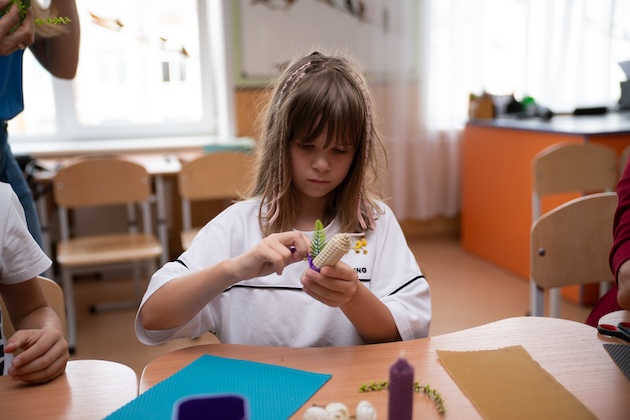
KYIV Kyiv & NAIROBI, Sep 13 (IPS) – In a major escalation of a conflict that began in 2014 and is the largest in Europe since World War II, Russia invaded Ukraine in February 2022. Thousands of Ukrainian civilians, many of them women and children, have been killed since then. Countless others have been forced from their homes and are clinging to what remains of the education system as their communities crumble.
During a high-level UN mission to Ukraine this week, Education Cannot Wait (ECW)—the United Nations Global Fund for Education in Emergencies and Protracted Crises—met with children affected by the war and local partners. The mission assessed the impact of the conflict on approximately 4 million children in Ukraine, whose education has been severely disrupted.
“We visited a school in Kyiv where classes continue despite the constant threat of attacks. Alarms often indicate an imminent danger. The school has a bomb shelter for 500 children, but there are more than 1,000 students enrolled. To ensure that everyone has access to the shelter when needed, primary school children go to school in the morning and secondary school children in the afternoon,” Yasmine Sherif, executive director of ECW, told IPS.
“We also spoke to psychologists and parents, including single mothers who have been displaced from the east, north and south of the country. They have come to Kyiv, leaving behind their children’s fathers and grandparents. We saw how a strong focus on mental health and social services is helping children and families cope with these challenges, with excellent collaboration between teachers, psychologists, parents and the wider community. The Ministry of Education is working tirelessly to ensure safe learning environments for all children,” Sherif added.

According to Sherif, children in Ukraine are continuing to receive their education in core subjects like reading and math, as well as arts subjects, even under these difficult circumstances. ECW was among the first to invest in education in Ukraine, starting in 2017, with an initial emergency response supporting children along the frontlines in eastern Ukraine.
Since then, ECW has provided $27 million in funding to support high-quality, holistic education programs in Ukraine since 2017. As the conflict continues to escalate and the need for education increases, ECW has received much-needed donations from other donors, including Germany and Japan, to support education in Ukraine.
At last year’s Education Cannot Wait High-Level Financing Conference, the Global Business Coalition for Education pledged to mobilize $50 million from the business community to support ECW’s four-year strategic plan. In partnership with GBCE, TheirWorld, HP, and Microsoft, $39 million has already been mobilized in partnerships and device donations for ECW, and more than 70,000 laptops have been shared with schools, teachers, and others in need, both in Ukraine and neighboring countries.
This is a huge investment in expanding educational opportunities for children who do not have access to in-person education. Delivered by a consortium of partners including Finn Church Aid, the Kyiv School of Economics, Save the Children and UNICEF, in collaboration with the Ukrainian Ministry of Education and Science, ECW’s education programmes have reached more than 360,000 children to date, approximately 65 percent of whom are girls.

Against this backdrop, Munir Mammadzade, UNICEF Representative in Ukraine, stressed that “Education Cannot Wait’s support is crucial for children, their parents and teachers who are doing everything they can to keep classrooms open and education in schools, despite the impact of the war in the country.”
However, more funding is urgently needed. More than 1,300 educational institutions have been damaged or destroyed and nearly 600,000 children are still unable to access in-person education since the start of the school year in early September, due to ongoing deadly and destructive fighting, attacks and displacement.
“This horrific war must end now! As long as the children, adolescents and teachers in Ukraine endure this unfathomable horror, schools must be protected from attack. As a global community, we must rise to the challenge of ensuring that every girl and boy in Ukraine affected by this brutal war and the refugees have access to the safety, hope and opportunity that only a quality education can provide,” Sherif said.
ECW and its strategic partners are calling for an additional $600 million in funding from private and public donors to achieve the global goals outlined in the Fund’s 2023-2026 Strategic Plan. This funding would provide 20 million children in crisis-affected countries around the world with safe, inclusive, quality education and the hope of a better future.

According to Sherif, ECW’s investment in education is an investment in recovery, peace, security and justice for Ukraine and beyond. It is an investment in the enormous potential of future generations. Earlier this year, ECW announced an allocation of $18 million to roll out a multi-year resilience program in Ukraine. The investment aims to raise an additional $17 million to reach more than 150,000 children in 10 of the country’s hardest-hit areas.
The programme focuses on improving learning outcomes in safer, more accessible environments and expanding digital learning options as an alternative. There is also a strong emphasis on mental health, psychosocial support and targeted interventions for girls and children with disabilities.
The high-level UN mission concluded at the Fourth Summit of First Ladies and Gentlemen, where ECW called on world leaders to commit to protecting education from attack and to scale up funding to provide life-saving access to safe education, both in-person and through distance learning where needed, as well as catch-up classes for children who have fallen behind.
IPS UN Office Report
Follow @IPSNewsUNBureau
Follow IPS News UN Bureau on Instagram
© Inter Press Service (2024) — All rights reservedOriginal source: Inter Press Service







